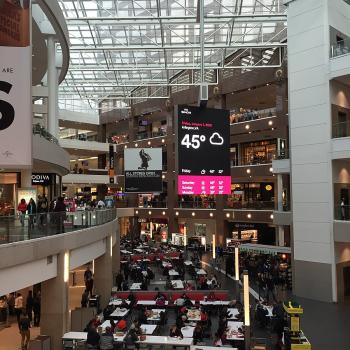Hey y’all. A couple weeks ago I spoke to the Missio Alliance conference about friendship and celibate vocations, on a panel about “a kingdom vision for intimacy, desire, and sexual practice.” And one thing which came up in conversation with Bruxy Cavey was the need for two different approaches to supporting people in what we might call overlooked vocations: paths of love other than marriage, parenting, priesthood and religious life.
One approach looks to the church to be family for people who do not have more conventional family lives. The church here takes you in; it becomes your home and your kin. The people who care for you when you’re sick, the people for whom you cook, the people who share your struggles and celebrate your joys are the people in your church. The church becomes a kind of small town, communal, inescapable.
I strongly believe that our churches need to look more like this familial, Acts of the Apostles church. There are specific things we can do in “official” and private ways: welcoming people at the door (or the parking lot? I hear some people live in suburbs), speaking with people who come to church alone, having food and drink after worship to which we can invite people. These are starting points from which we build deeper bonds. I don’t do that and I need to get over myself. It’s often really hard to come into a church and find a home there; and it’s hardest for the people who need it the most.
The pregnancy center where I volunteer matches clients with churches: If you don’t already have a church home but you want one, you fill out a form where you answer various questions and then somebody calls you and comes to get you and takes you to church. The choice of questions strikes me as a bit “lol Protestants”–out of five questions, one is about dress code and none are about Eucharist? okay–but this is an obvious thing you could do right now, if you’re not doing it already and it makes sense for you: Contact your local pregnancy center, or other place where people in need might go (we’re all in need, yo, there are plenty of options), and ask if they do this and, if so, if you can be a contact-and-carpool person for your church. This, again, is the first step in what could (if both of you want this) become a deeper and more familial relationship. I’m reminded of Ross Douthat’s acute column about the ways in which the churches aren’t failing people in poverty–but, more importantly, the ways they are failing them.
But the thing is, also, I go to the cathedral church. St Matthew’s is a wonderful place, beautiful and life-changing, a haven for many–and, if I can strike a provincial note, specifically a haven for gay people on all points of the spectrum of belief and sacramental participation. I’ve received terrific spiritual direction there and met a tiny but vibrant community of celibate gay Christians. But it is just not possible to know everyone at St Matthew’s. We are not even an extended family. Could you have a family reunion of all the world’s Joneses? We do have food and drink after Mass, but it’s hard to know where to get started at St Matt’s, I think; and when priests try to get us to, like, talk to one another before Mass, it feels really artificial and pointless because there isn’t that real basis of commitment and endurance which would bind the whole parish together beyond Sunday worship.
This isn’t a criticism really. I know we could be more welcoming–and, specifically, we could do more to help people find the smaller ministries in which they really can find friendship and brotherhood. We could especially be doing more on that score for people who don’t fit an obvious identity category like “gay” or “young adult.” It took me a really long time to feel that St Matt’s was my home. But I don’t actually think there’s anything wrong with being a cathedral. St Matt’s is a big church in a famously transient city and that limits the degree to which it can be your family.
Moreover, even if the small familial church were the One Best Way (and I don’t know that it is; it has its own characteristic problems and is hard for a different set of people, often especially including gay people or others who might be subjected to gossip or judgment), lots of people do not go to small familial churches and yet need support in their vocations right now, not in the ideal future.
So I’m not too surprised that Bruxy and I used very different frameworks for approaching how we can support overlooked vocations like friendship, service, extended-family care, and celibate partnership. I focused on the vocations themselves: How can we support friendship? How can we support extended-family kinship? etc, rather than, How can we create church communities which are havens for individual unmarried people? I’ve explored my answers to my own question pretty extensively, but I thought it was worth noting that there is this other question also–one which is especially pressing for people who don’t start off with preexisting deep friendships or other vocations–and both questions are important.











